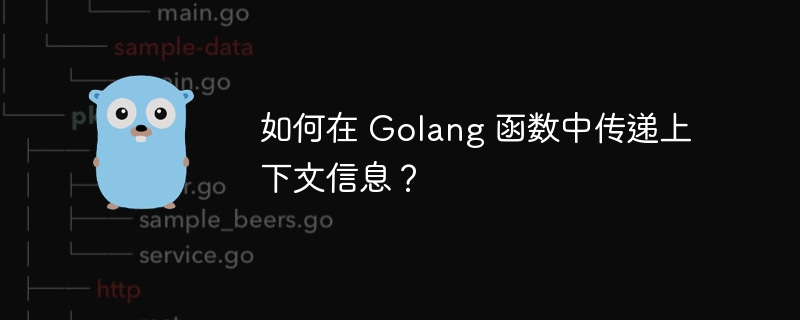如何在 Golang 函数中传递上下文信息?
时间:2024-09-13 21:43:58 196浏览 收藏
学习知识要善于思考,思考,再思考!今天golang学习网小编就给大家带来《如何在 Golang 函数中传递上下文信息?》,以下内容主要包含等知识点,如果你正在学习或准备学习Golang,就都不要错过本文啦~让我们一起来看看吧,能帮助到你就更好了!
Golang 中可以使用 context 包来传递上下文信息:使用 context.Background() 创建一个新的上下文。使用 context.WithValue() 将值添加到上下文中。使用 ctx.Value() 获取上下文中存储的值。

如何在 Golang 函数中传递上下文信息?
在并发程序中传递上下文信息至关重要,它允许在不同 goroutine 中访问共享数据。这对于日志记录、追踪、错误处理和传递中间数据很有用。
使用 Context 包
Go 标准库提供了一个 context 包,它提供了用于管理上下文信息的类型和函数。
要创建一个新的 context.Context,请使用 context.Background():
ctx := context.Background()
您可以使用 context.WithValue() 将值添加到上下文中:
ctx = context.WithValue(ctx, "key", "value")
您可以在任何地方获取上下文中存储的值:
value := ctx.Value("key")实战案例
假设我们有一个 goroutine池,它执行并行任务。我们要在每个 goroutine 中记录任务的开始和结束时间。
package main
import (
"context"
"fmt"
"time"
)
func main() {
ctx, cancel := context.WithCancel(context.Background())
defer cancel()
// 创建 goroutine 池
pool := make(chan func())
for i := 0; i < 10; i++ {
go func(ctx context.Context, i int) {
fmt.Println("Task", i, "started")
// 这里我们使用了上下文里的时间戳来计算任务耗时
start := time.Now()
ctx = context.WithValue(ctx, "start", start)
// 模拟任务执行
time.Sleep(time.Second)
// 获取任务开始时间并计算耗时
start = ctx.Value("start").(time.Time)
fmt.Printf("Task %d ended, took %v\n", i, time.Since(start))
}(ctx, i)
pool <- nil
}
close(pool)
time.Sleep(5 * time.Second)
}在此示例中,我们使用 context.WithValue() 将 start 时间戳添加到上下文中。然后,在 goroutine 中,我们可以通过 ctx.Value() 获取开始时间戳,并计算任务的耗时。
注意事项
- 垃圾回收会清理上下文对象,因此确保在需要时进行传递。
- 不要将引用对象存储在上下文中,因为它可能会导致内存泄漏。
- 避免在多个 goroutine 中写入相同的上下文,因为这可能会导致竞争条件。
今天关于《如何在 Golang 函数中传递上下文信息?》的内容介绍就到此结束,如果有什么疑问或者建议,可以在golang学习网公众号下多多回复交流;文中若有不正之处,也希望回复留言以告知!
-
505 收藏
-
503 收藏
-
502 收藏
-
502 收藏
-
502 收藏
-
272 收藏
-
172 收藏
-
270 收藏
-
312 收藏
-
392 收藏
-
185 收藏
-
389 收藏
-
370 收藏
-
126 收藏
-
197 收藏
-
221 收藏
-
310 收藏
-

- 前端进阶之JavaScript设计模式
- 设计模式是开发人员在软件开发过程中面临一般问题时的解决方案,代表了最佳的实践。本课程的主打内容包括JS常见设计模式以及具体应用场景,打造一站式知识长龙服务,适合有JS基础的同学学习。
- 立即学习 543次学习
-

- GO语言核心编程课程
- 本课程采用真实案例,全面具体可落地,从理论到实践,一步一步将GO核心编程技术、编程思想、底层实现融会贯通,使学习者贴近时代脉搏,做IT互联网时代的弄潮儿。
- 立即学习 516次学习
-

- 简单聊聊mysql8与网络通信
- 如有问题加微信:Le-studyg;在课程中,我们将首先介绍MySQL8的新特性,包括性能优化、安全增强、新数据类型等,帮助学生快速熟悉MySQL8的最新功能。接着,我们将深入解析MySQL的网络通信机制,包括协议、连接管理、数据传输等,让
- 立即学习 500次学习
-

- JavaScript正则表达式基础与实战
- 在任何一门编程语言中,正则表达式,都是一项重要的知识,它提供了高效的字符串匹配与捕获机制,可以极大的简化程序设计。
- 立即学习 487次学习
-

- 从零制作响应式网站—Grid布局
- 本系列教程将展示从零制作一个假想的网络科技公司官网,分为导航,轮播,关于我们,成功案例,服务流程,团队介绍,数据部分,公司动态,底部信息等内容区块。网站整体采用CSSGrid布局,支持响应式,有流畅过渡和展现动画。
- 立即学习 485次学习

